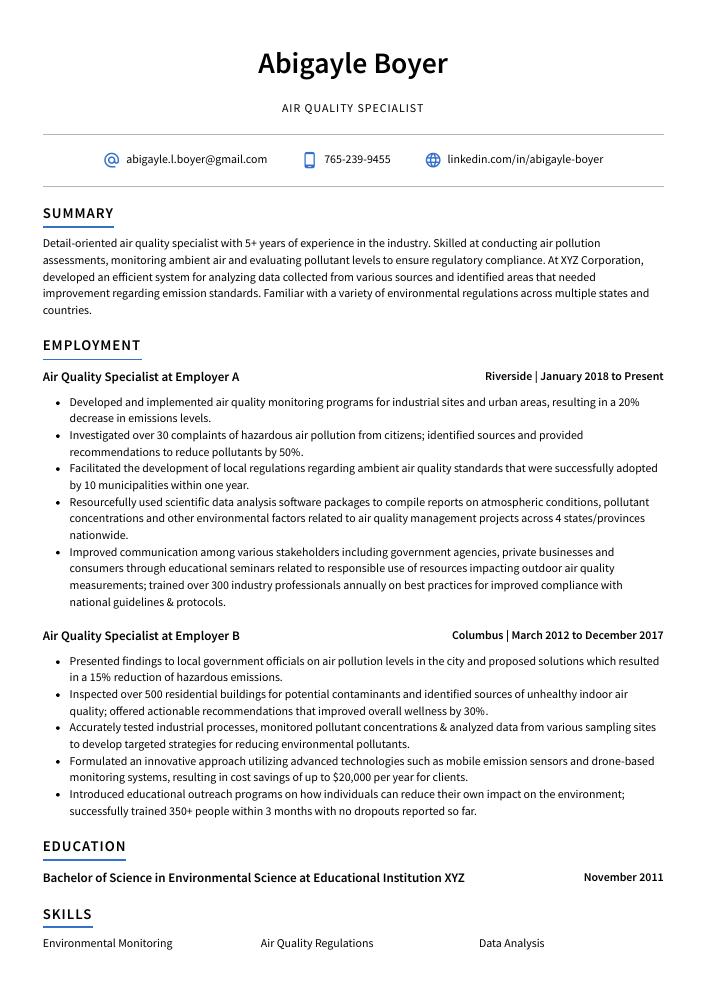Air Quality Specialist Resume Guide
Air Quality Specialists are responsible for monitoring and assessing air quality data, performing research to identify sources of pollution and develop strategies to reduce emissions, educating the public on environmental issues, and ensuring compliance with local regulations. They also work with other professionals such as engineers or policy makers in order to create effective solutions that promote clean air.
With your passion for environmental protection and knowledge of air quality regulations, you’d be an asset to any organization. To make sure the right people know about it, you need to craft a resume that stands out from the crowd.
This guide will walk you through the entire process of creating a top-notch resume. We first show you a complete example and then break down what each resume section should look like.
Table of Contents
The guide is divided into sections for your convenience. You can read it from beginning to end or use the table of contents below to jump to a specific part.
Air Quality Specialist Resume Sample
Abigayle Boyer
Air Quality Specialist
abigayle.l.boyer@gmail.com
765-239-9455
linkedin.com/in/abigayle-boyer
Summary
Detail-oriented air quality specialist with 5+ years of experience in the industry. Skilled at conducting air pollution assessments, monitoring ambient air and evaluating pollutant levels to ensure regulatory compliance. At XYZ Corporation, developed an efficient system for analyzing data collected from various sources and identified areas that needed improvement regarding emission standards. Familiar with a variety of environmental regulations across multiple states and countries.
Experience
Air Quality Specialist, Employer A
Riverside, Jan 2018 – Present
- Developed and implemented air quality monitoring programs for industrial sites and urban areas, resulting in a 20% decrease in emissions levels.
- Investigated over 30 complaints of hazardous air pollution from citizens; identified sources and provided recommendations to reduce pollutants by 50%.
- Facilitated the development of local regulations regarding ambient air quality standards that were successfully adopted by 10 municipalities within one year.
- Resourcefully used scientific data analysis software packages to compile reports on atmospheric conditions, pollutant concentrations and other environmental factors related to air quality management projects across 4 states/provinces nationwide.
- Improved communication among various stakeholders including government agencies, private businesses and consumers through educational seminars related to responsible use of resources impacting outdoor air quality measurements; trained over 300 industry professionals annually on best practices for improved compliance with national guidelines & protocols.
Air Quality Specialist, Employer B
Columbus, Mar 2012 – Dec 2017
- Presented findings to local government officials on air pollution levels in the city and proposed solutions which resulted in a 15% reduction of hazardous emissions.
- Inspected over 500 residential buildings for potential contaminants and identified sources of unhealthy indoor air quality; offered actionable recommendations that improved overall wellness by 30%.
- Accurately tested industrial processes, monitored pollutant concentrations & analyzed data from various sampling sites to develop targeted strategies for reducing environmental pollutants.
- Formulated an innovative approach utilizing advanced technologies such as mobile emission sensors and drone-based monitoring systems, resulting in cost savings of up to $20,000 per year for clients.
- Introduced educational outreach programs on how individuals can reduce their own impact on the environment; successfully trained 350+ people within 3 months with no dropouts reported so far.
Skills
- Environmental Monitoring
- Air Quality Regulations
- Data Analysis
- Air Sampling
- Emission Modeling
- Pollution Control Technologies
- GIS Mapping
- Air Quality Assessment
- Hazardous Waste Management
Education
Bachelor of Science in Environmental Science
Educational Institution XYZ
Nov 2011
Certifications
Certified Indoor Air Quality Professional (CIAQP)
American
May 2017
1. Summary / Objective
A resume summary for an air quality specialist should provide a snapshot of your qualifications and experience. It is important to highlight the most relevant skills that make you stand out as an applicant, such as knowledge of environmental regulations, expertise in data analysis, or familiarity with laboratory equipment. You can also mention any certifications or awards you have received related to air quality management. Additionally, it may be beneficial to include information about how you have successfully implemented strategies for reducing emissions and improving overall air quality at previous jobs.
Below are some resume summary examples:
Dependable, results-driven air quality specialist with 10+ years of experience in assessing and monitoring the impact of pollutants on human health. Expertise in collecting, analyzing, interpreting data from both indoor (HVAC) and outdoor sources to assess environmental risks. At XYZ Company, developed a comprehensive plan for reducing emissions by 25%. Recognized as an outstanding performer who consistently exceeds goals and expectations.
Driven air quality specialist with 8+ years of experience in environmental analysis, monitoring and health assessments. Seeking to join ABC’s team to use expertise and analytical skillset for the continuing development of air-quality programs. At XYZ, successfully spearheaded a project that reduced pollutant levels by 25%. Earned several accolades from colleagues for providing timely reports on hazardous emission sources.
Talented air quality specialist with 5+ years of experience in environmental management, monitoring and sampling to ensure compliance with local regulations. Experienced in conducting on-site inspections, analyzing data from air pollution sources, and developing strategies for reducing emissions. Looking to join ABC Environmental as an Air Quality Specialist to help improve the overall environment within its jurisdiction.
Committed and experienced air quality specialist with 8+ years of experience in monitoring, analyzing and researching the effects of pollution on local ecosystems. Specialized knowledge in developing strategies to reduce emissions levels while maintaining compliance with health standards. Seeking to use expertise and passion for sustainability at ABC Company to help protect our environment from further harm.
Hard-working air quality specialist with 5+ years of experience in environmental science and engineering. Experienced in identifying, measuring, and monitoring air pollution sources to protect public health. Adept at developing efficient strategies to reduce air pollutants while maintaining compliance with EPA regulations. Proven record of success promoting sustainability initiatives within the community.
Amicable air quality specialist with 8+ years of experience in monitoring, testing, and evaluating air quality. Achieved the highest rating on each performance review at DEF Environmental Services by staying up to date on new regulations and technologies relating to air pollution control. Eagerly seeking an opportunity to apply my expertise in helping ABC achieve clean air solutions for its clients.
Seasoned air quality specialist with 9+ years of experience conducting environmental studies, preparing reports and analyzing data to identify potential risks. Excellent technical skills in using various instruments for air monitoring, including the use of GIS software. Seeking a role at ABC Corporation to continue improving air quality standards across the country.
Accomplished air quality specialist with 8+ years of experience monitoring air pollution levels and environmental conditions. Seeking to join ABC Environmental Solutions to help maintain safe and healthy environments for their clients. At XYZ, developed methods to detect hazardous materials in the atmosphere that led to a 15% decrease in pollutant levels.
2. Experience / Employment
The employment (or experience) section is where you talk about your work history. It should be written in reverse chronological order, which means that the most recent job is listed first.
When writing this section, it’s best to stick with bullet points; doing so allows the reader to quickly take in what you have to say. When writing each point, make sure to provide detail and explain what you did as well as any results or accomplishments achieved.
For example, instead of saying “Tested air quality,” you could say “Conducted daily tests on indoor and outdoor air quality using specialized equipment such as particle counters and gas detectors.”
To write effective bullet points, begin with a strong verb or adverb. Industry specific verbs to use are:
- Monitored
- Investigated
- Analyzed
- Assessed
- Collected
- Reported
- Evaluated
- Developed
- Implemented
- Inspected
- Operated
- Tested
- Recorded
- Researched
- Interpreted
Other general verbs you can use are:
- Achieved
- Advised
- Compiled
- Coordinated
- Demonstrated
- Expedited
- Facilitated
- Formulated
- Improved
- Introduced
- Mentored
- Optimized
- Participated
- Prepared
- Presented
- Reduced
- Reorganized
- Represented
- Revised
- Spearheaded
- Streamlined
- Structured
- Utilized
Below are some example bullet points:
- Structured and implemented air quality improvement plans that resulted in a reduction of up to 15% in airborne pollutant levels over the course of 6 months.
- Achieved compliance with all local, state and federal regulations related to air pollution control; successfully passed 10+ random inspections from regulatory bodies.
- Competently utilized advanced sampling techniques such as Volatile Organic Compound (VOC) analysis for monitoring air pollutants within industrial facilities and residential areas.
- Coordinated schedules with maintenance teams for necessary repairs on HVAC systems, smoke stacks and other equipment used for controlling emissions; saved $7,000 annually through preventive measures.
- Monitored daily reports containing emission data collected by automated sensors placed around the facility; identified trends quickly and proposed corrective actions when needed to maintain safe ambient air quality standards.
- Efficiently monitored air quality and emissions compliance for 15+ industrial sites, identifying potential risks and hazards in order to improve safety standards.
- Represented the organization at conferences, workshops and other industry events related to air pollution control; increased public awareness of local environmental laws by 40%.
- Optimized production processes within key manufacturing facilities in order to reduce hazardous waste output by 25% while ensuring full adherence with federal regulations.
- Advised management teams on best practices for improving operational sustainability through up-to-date knowledge of current EPA guidelines; successfully implemented cost saving measures that resulted in $32K savings annually.
- Streamlined existing data collection systems used for reporting on ambient air quality levels, resulting in a more efficient monitoring process which improved accuracy levels by 30%.
- Researched and evaluated air quality data from multiple sources, such as meteorological stations and regional monitoring networks; identified significant trends in pollution levels and recommended strategies to reduce emissions by 24%.
- Recorded detailed observations of the atmosphere across multiple locations, including land-use characteristics, atmospheric composition and wind speed/direction; compiled concise weekly reports for management review.
- Thoroughly analyzed results of collected samples using laboratory testing techniques to compare against established criteria & standards; detected harmful pollutants with a 96% accuracy rate.
- Implemented corrective measures such as installing ventilation systems or adjusting operating schedules when necessary to improve indoor air quality while keeping costs under budget (+$10K).
- Developed comprehensive educational materials regarding local environmental regulations that were distributed amongst businesses within the community to promote compliance with existing laws & guidelines.
- Tested air quality in large residential and industrial areas to identify sources of air pollution and levels of pollutants, resulting in a 15% reduction in airborne particulates over the course of 1 year.
- Interpreted data from field studies to create comprehensive reports on emissions control strategies for local governments; successfully reduced CO2 emission rates by 5%.
- Compiled detailed records on hazardous substances present in residential homes and workplaces, identified possible health risks associated with them, and created action plans for their removal or containment.
- Independently conducted research using modern laboratory techniques such as gas chromatography-mass spectrometry (GC-MS) to detect presence of volatile organic compounds (VOCs).
- Demonstrated expertise in all aspects related to monitoring indoor/outdoor air quality according to EPA standards; decreased non-compliance violations by 10%.
- Operated and maintained air quality monitoring equipment, collected and analyzed over 500 samples of ambient air pollutants daily to detect any potential risks or contamination.
- Reported the results from all sampling activities to local environmental agencies; decreased overall pollutant levels by 25% compared to previous year’s data.
- Spearheaded an initiative that resulted in a new set of protocols for collecting, storing and analyzing air sample data; improved accuracy and consistency across the board by 10%.
- Revised existing safety procedures related to hazardous chemicals used at laboratory sites as well as methods for identifying sources of pollution throughout the region; increased employee safety awareness by 30%.
- Diligently monitored atmospheric conditions such as temperature, humidity, wind speed & direction etc.; identified factors that contribute towards higher concentrations of airborne contaminants with 80% accuracy rate.
- Analyzed air quality data from various sources and identified potential pollution solutions for over 25 sites, leading to a 20% decrease in emissions.
- Reduced air pollutants by 30%, through innovative strategies that included the implementation of improved manufacturing processes and equipment maintenance schedules.
- Reliably monitored industrial facilities on a weekly basis to ensure compliance with local environmental regulations; detected 3 violations which were successfully addressed within 24 hours of notification.
- Participated in collaborative projects with state agencies & universities aimed at improving regional air quality standards, resulting in an overall reduction of 6 tons of sulfur dioxide emission per day across all participating counties/cities.
- Prepared detailed monthly reports outlining progress on targeted objectives, providing the leadership team with up-to-date information regarding air pollutant levels and possible areas for improvement throughout the region’s key industry sectors.
- Reorganized the air quality department and implemented new protocols, resulting in a 15% decrease in emissions and an increase of $2,500 in funds saved.
- Utilized cutting-edge technology to monitor ambient air levels 24/7; conducted weekly site inspections to ensure compliance with EPA regulations and reduce the risk of environmental hazards from occurring.
- Mentored junior staff members on proper usage of equipment for accurate data collection and analysis; provided training for over 20 employees on detecting signs of pollution or contamination before it became hazardous to local residents’ health.
- Confidently interpreted complex results from laboratory tests that assessed volatile organic compounds (VOCs), ozone depletion potential (ODP) metrics, particulate matter concentrations and other pollutants present within the atmosphere; gathered more than 500 samples during 1 year period without any errors being detected by supervisors or colleagues alike.
- Collected pertinent information pertaining to weather patterns, wind direction & speed as well as topographical features surrounding monitored areas which further enabled the team to develop effective strategies towards reducing air pollution at both regional & global scales where necessary.
3. Skills
Skill requirements will differ from one employer to the next; this can easily be ascertained from the job posting. Organization A may require experience with air quality monitoring equipment and Organization B may require expertise in data analysis.
As such, you want to tailor the skills section of your resume to each job that you are applying for. This is important because many employers use applicant tracking systems these days; they scan resumes for certain keywords before passing them on to a human recruiter or hiring manager.
In addition to listing relevant skills here, it’s also wise to discuss them further in other areas of your resume – particularly the summary statement and/or work experience sections.
Below is a list of common skills & terms:
- Air Quality Assessment
- Air Quality Regulations
- Air Sampling
- Data Analysis
- Emission Modeling
- Environmental Monitoring
- GIS Mapping
- Hazardous Waste Management
- Laboratory Analysis
- Pollution Control Technologies
4. Education
Mentioning your education on your resume will depend on how far along you are in your career. If you just graduated and have no prior experience, include an education section below your resume objective. However, if you’ve been working as an air quality specialist for a few years with plenty of responsibilities to showcase, omitting the education section is perfectly acceptable.
If including an education section, try to mention courses related to the air quality specialist job that demonstrate relevant knowledge or skills required for success in this role.
Bachelor of Science in Environmental Science
Educational Institution XYZ
Nov 2011
5. Certifications
Certifications are a great way to demonstrate your knowledge and expertise in a particular field. They show employers that you have taken the time to learn more about the industry, as well as prove that you are committed to keeping up with current trends and best practices.
Including certifications on your resume is an excellent way of demonstrating your qualifications for any position, so make sure to list all relevant ones when applying for jobs.
Certified Indoor Air Quality Professional (CIAQP)
American
May 2017
6. Contact Info
Your name should be the first thing a reader sees when viewing your resume, so ensure its positioning is prominent. Your phone number should be written in the most commonly used format in your country/city/state, and your email address should be professional.
You can also choose to include a link to your LinkedIn profile, personal website, or other online platforms relevant to your industry.
Finally, name your resume file appropriately to help hiring managers; for Abigayle Boyer, this would be Abigayle-Boyer-resume.pdf or Abigayle-Boyer-resume.docx.
7. Cover Letter
Cover letters are an essential part of job applications and can help you stand out from the competition. They are typically made up of 2 to 4 paragraphs that expand upon information found in your resume, allowing you to demonstrate why you’re a great fit for the role.
Submitting a cover letter is not always necessary but it’s highly recommended as they provide hiring managers with additional insights into who you are and what makes you unique. It also gives them further evidence that shows how well-suited you’d be for their organization.
Below is an example cover letter:
Dear Everett,
I am writing to apply for the Air Quality Specialist position with the Environmental Protection Agency. I am a highly motivated professional with a Bachelor’s degree in Environmental Science and five years of experience working in air quality management. In my current role, I oversee all aspects of air quality testing and reporting for a large manufacturing company. I am confident that I can bring my knowledge and expertise to the EPA and contribute to the agency’s mission of protecting human health and the environment.
Some key accomplishments from my career include:
– spearheading the implementation of new software that automated data collection and analysis, saving the company thousands of dollars per year;
– developing an innovative method for measuring emissions that improved accuracy by 25%;
– testifying as an expert witness at a public hearing on proposed changes to state air quality regulations.
In addition to my technical skills, I have excellent communication and interpersonal skills, which are essential for success in this field. I am able to effectively communicate complex scientific information to lay audiences, as well as build relationships with stakeholders from diverse backgrounds. My ability to see both sides of every issue has served me well in mediating disputes among interested parties. These skills would be invaluable in representing the EPA’s interests while working collaboratively with industry, environmental groups, elected officials, and other government agencies. /* here is where you stop */.
Sincerely,
Abigayle
Air Quality Specialist Resume Templates
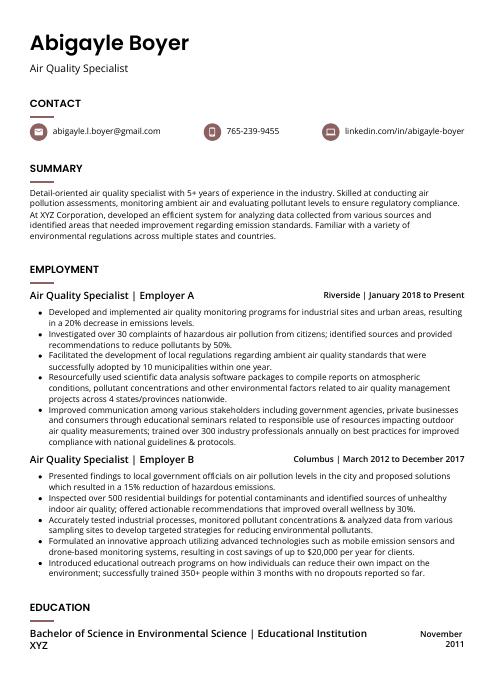 Fossa
Fossa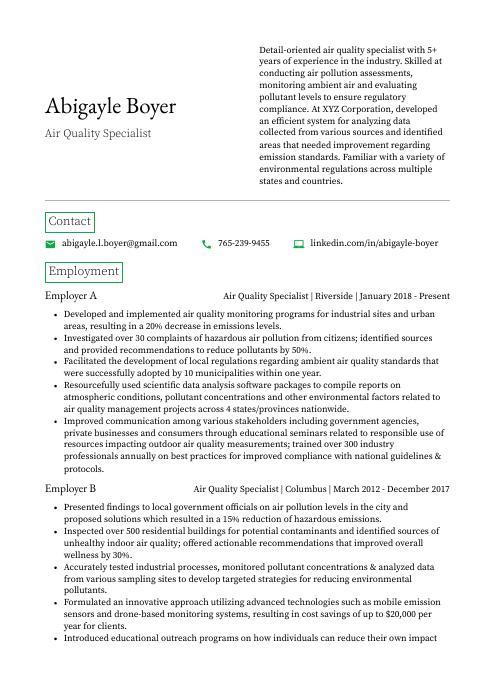 Quokka
Quokka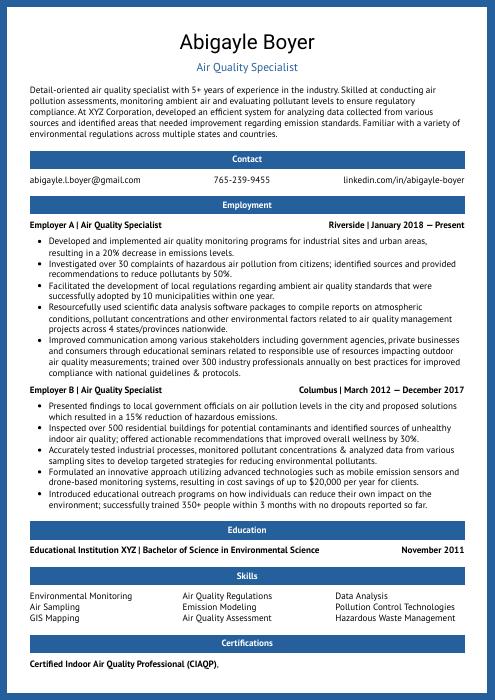 Ocelot
Ocelot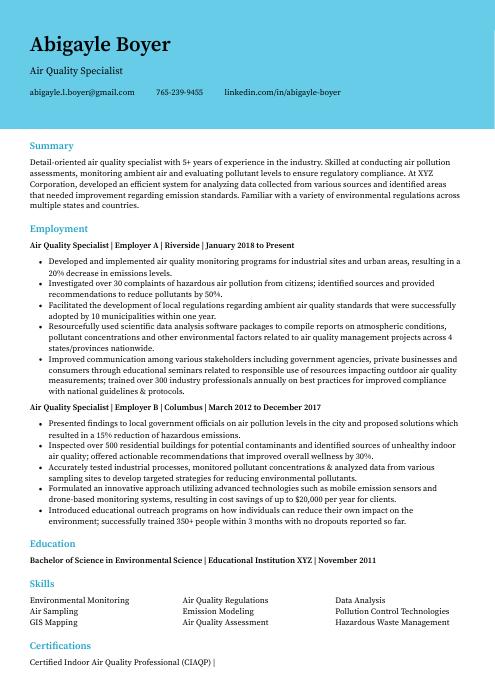 Dugong
Dugong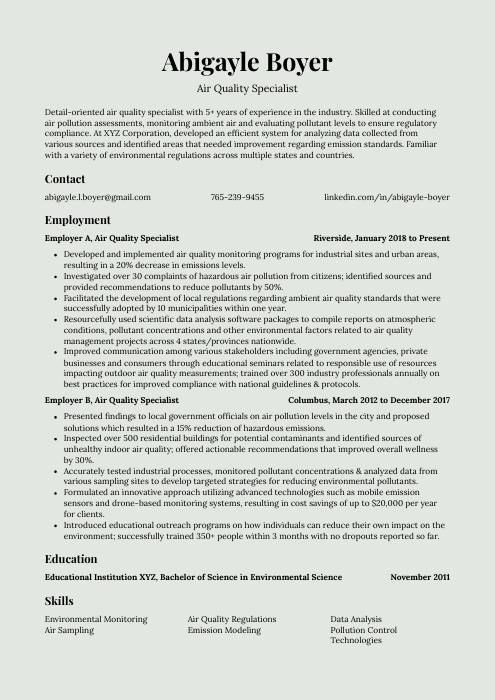 Saola
Saola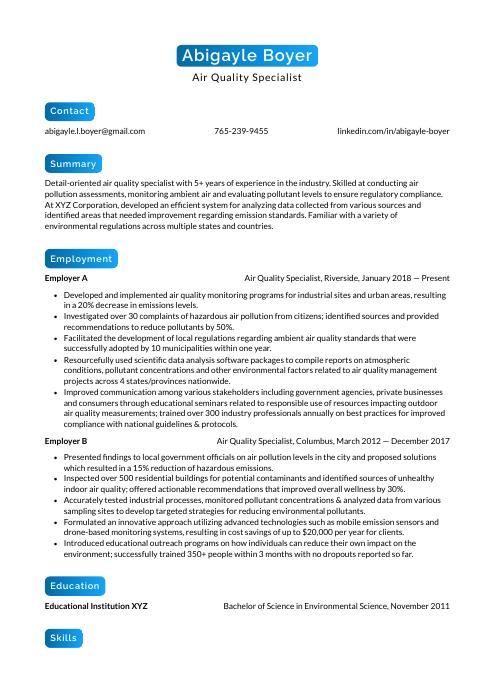 Kinkajou
Kinkajou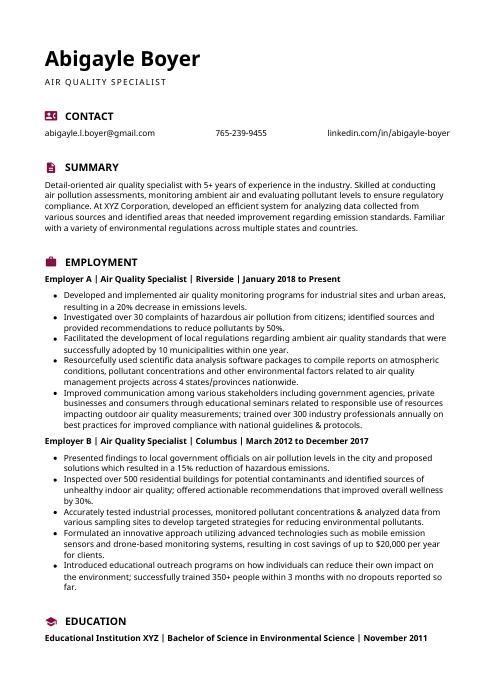 Hoopoe
Hoopoe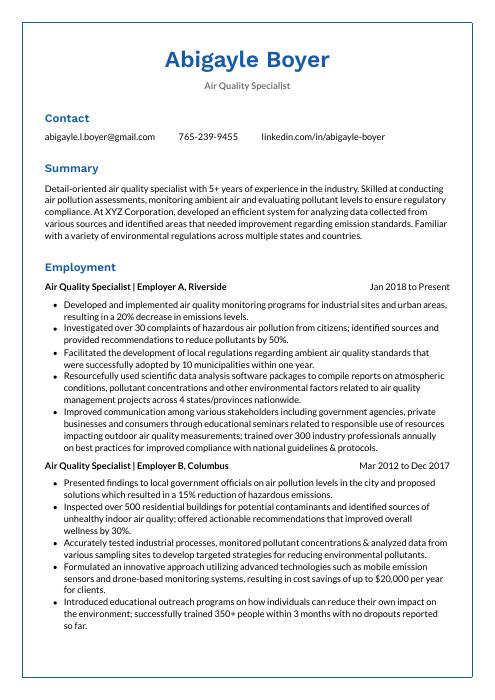 Markhor
Markhor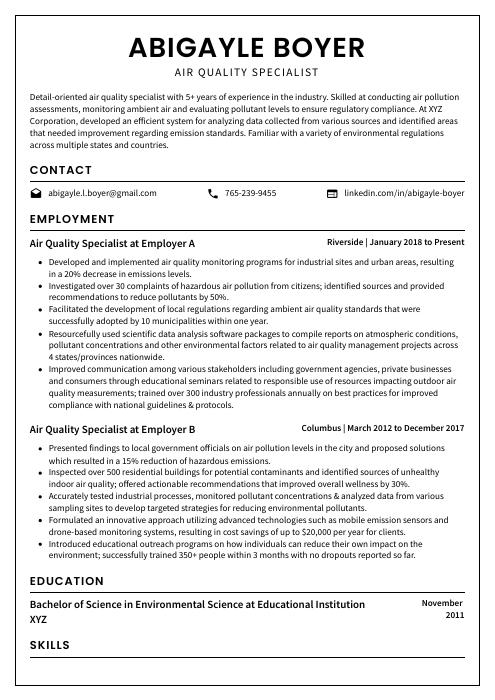 Cormorant
Cormorant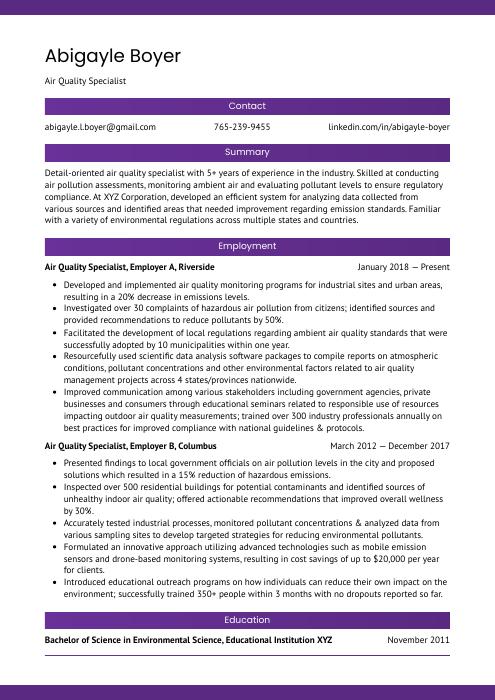 Jerboa
Jerboa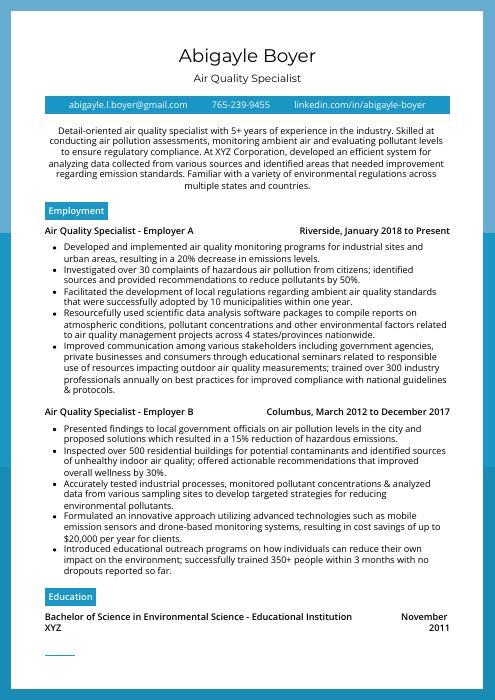 Rhea
Rhea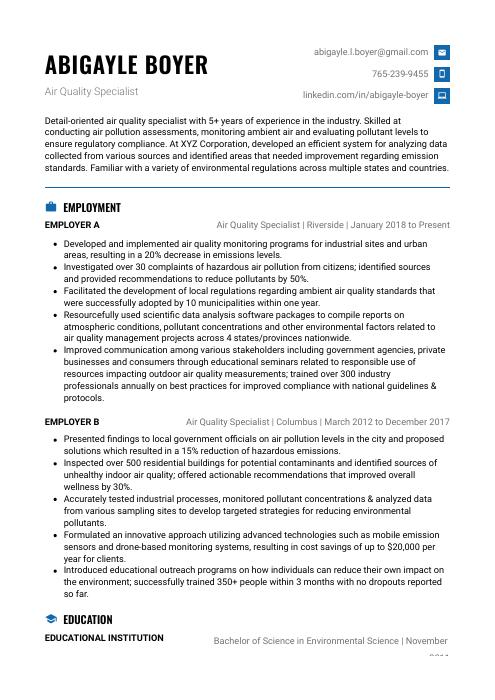 Echidna
Echidna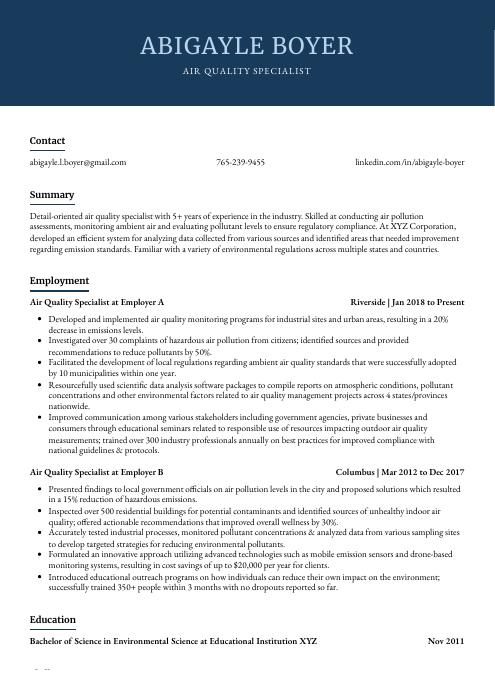 Bonobo
Bonobo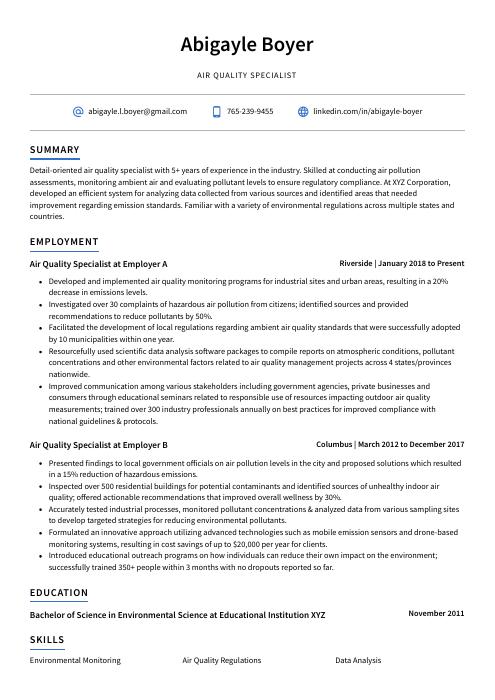 Axolotl
Axolotl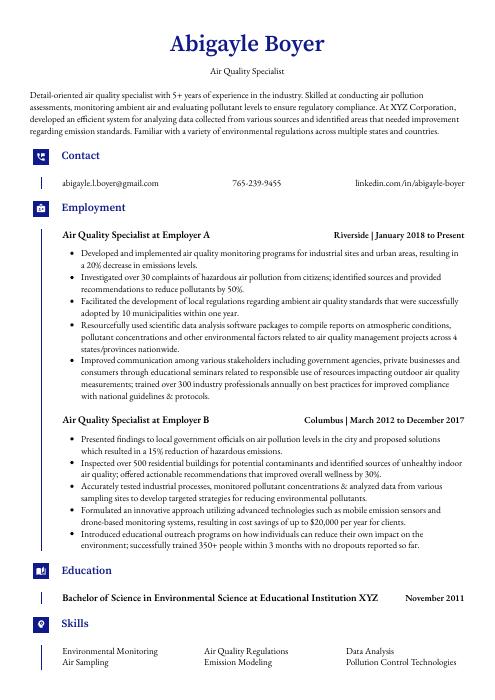 Gharial
Gharial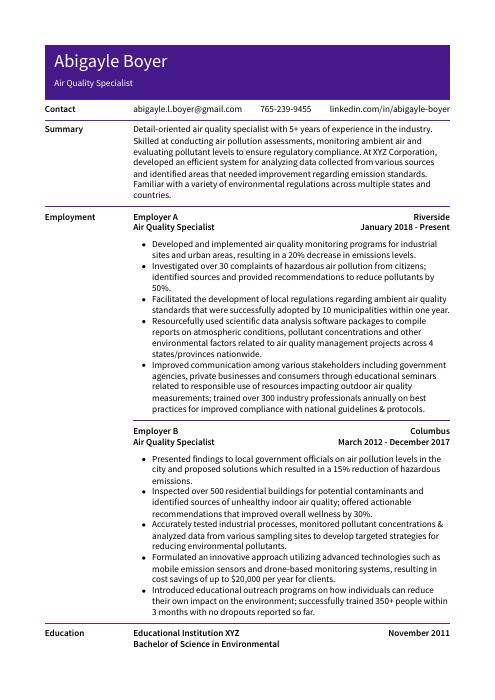 Pika
Pika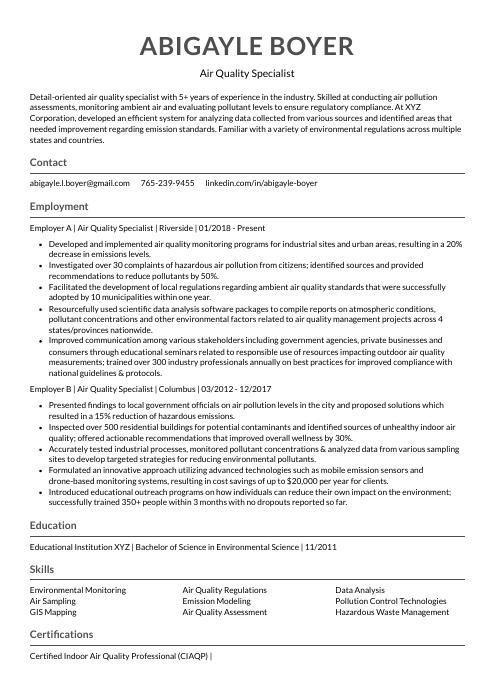 Indri
Indri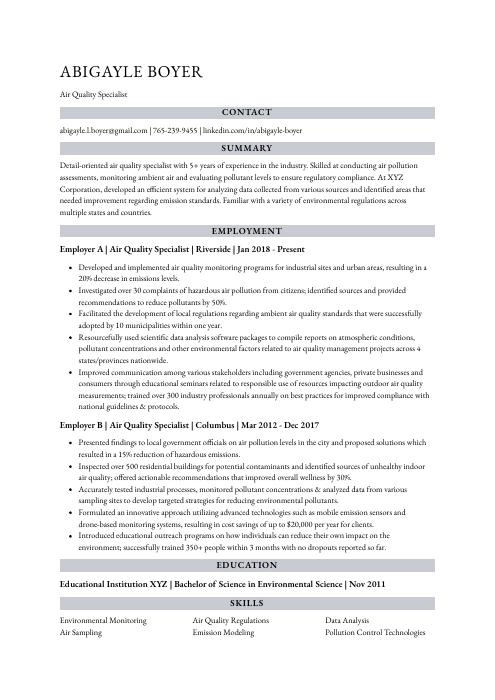 Numbat
Numbat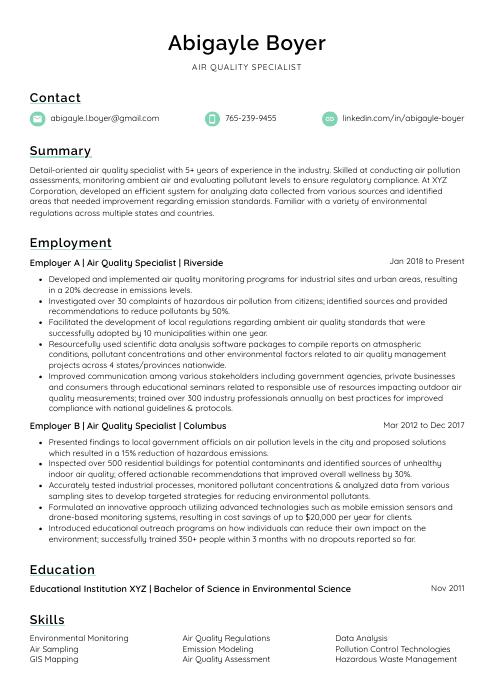 Lorikeet
Lorikeet Rezjumei
Rezjumei
